Memoirs of a Geisha - Movie Review (In Search of a Best Actress - Pt.1)
 Memoirs of a Geisha 2005
Memoirs of a Geisha 2005Well, as the year end Awards come pouring in faster than a laxative thru a Mexican, attention has been turning towards the lackluster quality of films available thus far and in particular to the blight of Best Actress potentials. We sadly have to agree with the media who are usually too keen for an attention grabbing headline to actually examine the quality of films within a given year. Now, we are not going to tell you that this year has been filled with crap, but when it comes down to picking a Top Ten or the eventual five nominees for the Oscars, it ain’t necessarily going to be a pretty selection.
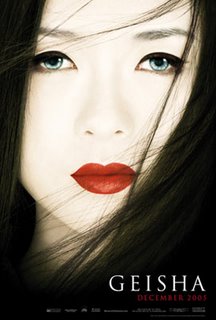 With that in mind, we grabbed our clogs and kimonos and ran out to go see “Memoirs of a Geisha”, which hoped to deliver not one, not two, but three potential award worthy female performances. For those of you who don’t read, well obviously you do, or what would you be doing here? Anywho, “Memoirs of a Geisha” is the film adaptation of the best selling novel by Arthur Golden, which concerns . . . well, the memoirs of a Geisha. (Now listen, kids . . . not every film has an obtuse title like “Syriana”.) We would bore you with the particulars of the plot, but honestly, what do you think this film is about? It’s not like the lead character runs off to join the circus, attend night school at her local community college, and one day emerges as the empress of Japan. Hardly. It concerns the tale of a young girl, sold off into indentured servitude at the local Geisha house as her sister is sloughed off to the nearest whorehouse (there is actually a difference as we will come to find out), and slowly rise up thru the ranks to become the Nipponese equivalent of a dance hall hostess. It’s like “Sweet Charity” meets “Shogun”. Which is not far off, since the director is Rob Marshall who brought forth the much overrated Oscar winning “Chicago” a few years back. Snooze. Okay, okay, we didn’t absolutely hate that flick, but found it to be gratingly simple and overdirected to within an inch of its cinched in sequined bodice. (Learn to say no, Rob. Or “cut”!) Anywho, the best we can say of Mr. Marshall is that he is pedestrian at best and woefully incapable at worst. In this case, the worst.
With that in mind, we grabbed our clogs and kimonos and ran out to go see “Memoirs of a Geisha”, which hoped to deliver not one, not two, but three potential award worthy female performances. For those of you who don’t read, well obviously you do, or what would you be doing here? Anywho, “Memoirs of a Geisha” is the film adaptation of the best selling novel by Arthur Golden, which concerns . . . well, the memoirs of a Geisha. (Now listen, kids . . . not every film has an obtuse title like “Syriana”.) We would bore you with the particulars of the plot, but honestly, what do you think this film is about? It’s not like the lead character runs off to join the circus, attend night school at her local community college, and one day emerges as the empress of Japan. Hardly. It concerns the tale of a young girl, sold off into indentured servitude at the local Geisha house as her sister is sloughed off to the nearest whorehouse (there is actually a difference as we will come to find out), and slowly rise up thru the ranks to become the Nipponese equivalent of a dance hall hostess. It’s like “Sweet Charity” meets “Shogun”. Which is not far off, since the director is Rob Marshall who brought forth the much overrated Oscar winning “Chicago” a few years back. Snooze. Okay, okay, we didn’t absolutely hate that flick, but found it to be gratingly simple and overdirected to within an inch of its cinched in sequined bodice. (Learn to say no, Rob. Or “cut”!) Anywho, the best we can say of Mr. Marshall is that he is pedestrian at best and woefully incapable at worst. In this case, the worst.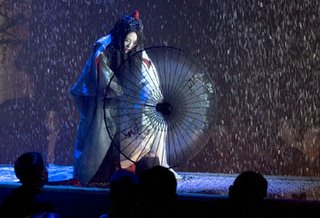 The film’s core concerns the education, training and grooming of the main character, Sayuri as the geisha of all geishas. Her coming out ball is the centerpiece of the film, and hinges on a “dance” that is meant to inspire a bidding war on her unplucked chrysanthemum. All we have to say after viewing the John Galliano meets Vegas showgirl style interpretive routine, is that Sayuri should consider herself lucky she wasn’t thrown to the curb post debacle, chanting out “Two Dollar, Make You Holler!” to passing lychee nut vendors.
The film’s core concerns the education, training and grooming of the main character, Sayuri as the geisha of all geishas. Her coming out ball is the centerpiece of the film, and hinges on a “dance” that is meant to inspire a bidding war on her unplucked chrysanthemum. All we have to say after viewing the John Galliano meets Vegas showgirl style interpretive routine, is that Sayuri should consider herself lucky she wasn’t thrown to the curb post debacle, chanting out “Two Dollar, Make You Holler!” to passing lychee nut vendors.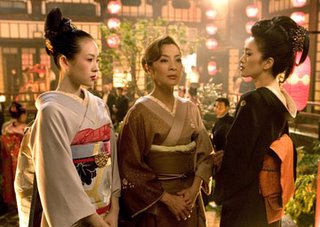 The best that this film has to offer is in the casting. Ripping a page out of those all star disaster epics of the 70s, Marshall has hired la crème de la crème of Asian cinema to star in his lackluster attempt at an epic. Ziyi Zhang, Gong Li, Michelle Yeoh, Ken Watanabe and even old Mako himself are among the talented Asian actors who have attempted to wrap their lips around the word “lips” to varying degrees of success. (You know, we sometimes wish we didn’t bother to do so much research for our reviews. For instance, we know that with the exception of that old stalwart, Mako – who appears briefly as the heroine’s father, the younger actors have a fleeting knowledge of the English language, and therefore most of them learned their roles phonetically, which leads to several clumsy moments as we shall see.) While we are big fans of the trio of leading ladies when they have appeared in such lustrous fare as: “Crouching Tiger, Hidden Dragon”, “2046”, “Raise the Red Lantern”, “Ju Dou”, “Farewell, My Concubine”, “Hero” and “House of Flying Daggers” – we could not help but be distracted by the choppiness of their line delivery. In particular with Ziyi Zhang, who felt so removed from her emotions we weren’t sure if we were watching a CGI image of the talented young beauty or the real deal.
The best that this film has to offer is in the casting. Ripping a page out of those all star disaster epics of the 70s, Marshall has hired la crème de la crème of Asian cinema to star in his lackluster attempt at an epic. Ziyi Zhang, Gong Li, Michelle Yeoh, Ken Watanabe and even old Mako himself are among the talented Asian actors who have attempted to wrap their lips around the word “lips” to varying degrees of success. (You know, we sometimes wish we didn’t bother to do so much research for our reviews. For instance, we know that with the exception of that old stalwart, Mako – who appears briefly as the heroine’s father, the younger actors have a fleeting knowledge of the English language, and therefore most of them learned their roles phonetically, which leads to several clumsy moments as we shall see.) While we are big fans of the trio of leading ladies when they have appeared in such lustrous fare as: “Crouching Tiger, Hidden Dragon”, “2046”, “Raise the Red Lantern”, “Ju Dou”, “Farewell, My Concubine”, “Hero” and “House of Flying Daggers” – we could not help but be distracted by the choppiness of their line delivery. In particular with Ziyi Zhang, who felt so removed from her emotions we weren’t sure if we were watching a CGI image of the talented young beauty or the real deal.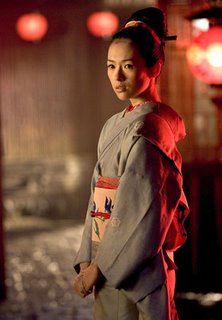 Ziyi Zhang has always struck us as a ravishing creature, who when portraying one of her kick-ass martial arts experts is breathtaking to observe for the dichotomy of physical prowess and elegant elfin appearance. In her portrayal of the lead character, Sayuri she is imminently watchable in her physicalization and less so in her line readings. While her hesitance can be excused as part of the characters timidity or sense of otherness in her new role as geisha in training, she simply comes up short in the emotional moments the film so desperately attempts to aggrandize. We regret being so familiar with her internationally successful martial arts epics: “Crouching Tiger, Hidden Dragon”, “Hero” and “House of Flying Daggers” – since we practically guffawed at the inevitable catfight scene between Sayuri and her arch nemesis, Hatusumomo. We were ready for Ziyi to drop kick Gong Li, fly thru the air and land en Pointe atop a Sake bottle. That scene might have worked better for us if she had.
Ziyi Zhang has always struck us as a ravishing creature, who when portraying one of her kick-ass martial arts experts is breathtaking to observe for the dichotomy of physical prowess and elegant elfin appearance. In her portrayal of the lead character, Sayuri she is imminently watchable in her physicalization and less so in her line readings. While her hesitance can be excused as part of the characters timidity or sense of otherness in her new role as geisha in training, she simply comes up short in the emotional moments the film so desperately attempts to aggrandize. We regret being so familiar with her internationally successful martial arts epics: “Crouching Tiger, Hidden Dragon”, “Hero” and “House of Flying Daggers” – since we practically guffawed at the inevitable catfight scene between Sayuri and her arch nemesis, Hatusumomo. We were ready for Ziyi to drop kick Gong Li, fly thru the air and land en Pointe atop a Sake bottle. That scene might have worked better for us if she had.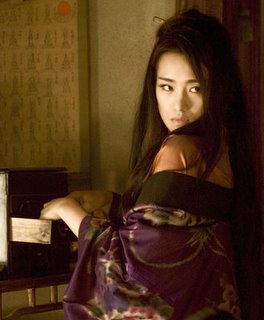 Gong Li is without a doubt, a screen goddess. It is a national disgrace that she is not revered as one of the best actresses alive today. Since our first exposure with her oeuvre at the foot of her svengali, Zhang Yiimou: “Ju Dou”, “Raise the Red Lantern”, “Shanghai Triad”, and “The Story of Qui Ju” we knew were witnessing the rise of a true acting legend. Luckily for us, in this flick she has the best role of the three. As the conniving, petulant, backstabbing Hatsumomo, Gong Li gets to let loose with fierce bursts of venom, curling her lips back to a smiling façade as she plans the best method to bring about our young heroine’s demise. She overcomes any difficulty with the language by the sheer power of her performance. She dominates the scenes and asserts her presence in every frame. If the ramshackle script by the usually dependable Robin Swicord where more solid, and the direction more polished this could have been Gong Li’s breakthrough role for the Western market. As it is, she should be content to know that her work follows in the time honored bitchy vein of all those tough dames that Bette Davis and Barbara Stanwyck used to pull off with such aplomb.
Gong Li is without a doubt, a screen goddess. It is a national disgrace that she is not revered as one of the best actresses alive today. Since our first exposure with her oeuvre at the foot of her svengali, Zhang Yiimou: “Ju Dou”, “Raise the Red Lantern”, “Shanghai Triad”, and “The Story of Qui Ju” we knew were witnessing the rise of a true acting legend. Luckily for us, in this flick she has the best role of the three. As the conniving, petulant, backstabbing Hatsumomo, Gong Li gets to let loose with fierce bursts of venom, curling her lips back to a smiling façade as she plans the best method to bring about our young heroine’s demise. She overcomes any difficulty with the language by the sheer power of her performance. She dominates the scenes and asserts her presence in every frame. If the ramshackle script by the usually dependable Robin Swicord where more solid, and the direction more polished this could have been Gong Li’s breakthrough role for the Western market. As it is, she should be content to know that her work follows in the time honored bitchy vein of all those tough dames that Bette Davis and Barbara Stanwyck used to pull off with such aplomb.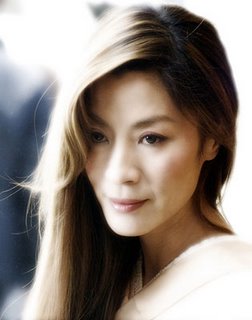 While Gong Li is the stand out due to in part to the juicy nature of her role, it is for Michelle Yeoh that we reserve our highest praise. She is the perfect blend of actress and role. She portrays the experienced geisha, Mameha who takes Ziyi Zhang’s character Sayuri under her wing for seemingly benevolent reasons. She glides onscreen with a refined bearing and glossy exterior masking a determination to overcome any odds thrown at her. In every scene, she brings poise, assurance, and an incandescent charm to her role that most actresses would kill to learn or at least copy. She is the gem at the heart of this movie, rising above all the dreck to deliver the goods. It may not be the flashiest role, but what little effect the film has is due mainly to the solid center she provides. Brava!
While Gong Li is the stand out due to in part to the juicy nature of her role, it is for Michelle Yeoh that we reserve our highest praise. She is the perfect blend of actress and role. She portrays the experienced geisha, Mameha who takes Ziyi Zhang’s character Sayuri under her wing for seemingly benevolent reasons. She glides onscreen with a refined bearing and glossy exterior masking a determination to overcome any odds thrown at her. In every scene, she brings poise, assurance, and an incandescent charm to her role that most actresses would kill to learn or at least copy. She is the gem at the heart of this movie, rising above all the dreck to deliver the goods. It may not be the flashiest role, but what little effect the film has is due mainly to the solid center she provides. Brava!
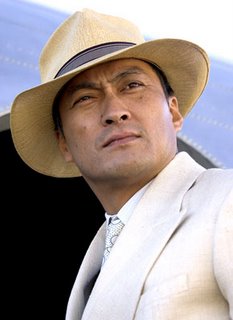 Ken Watanabe is sadly wasted as the male lead, the Chairman. After captivating audiences and the Academy alike with his Oscar nominated role in “The Last Samurai”, we had hoped he would emerge as a solid leading man. He probably will, in his native Japan. He is simply wasted as the genteel and terminally dull “knight in shining armor” role that he is saddled with. While his onscreen charisma cannot be dulled, he is never provided with enough material to flex his very capable thespic skills. Tsk, tsk, Mr. Marshall.
Ken Watanabe is sadly wasted as the male lead, the Chairman. After captivating audiences and the Academy alike with his Oscar nominated role in “The Last Samurai”, we had hoped he would emerge as a solid leading man. He probably will, in his native Japan. He is simply wasted as the genteel and terminally dull “knight in shining armor” role that he is saddled with. While his onscreen charisma cannot be dulled, he is never provided with enough material to flex his very capable thespic skills. Tsk, tsk, Mr. Marshall.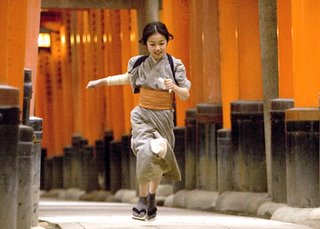 The remaining roles are filled out with varying degrees of success. We enjoyed Youki Kudoh as the slutty gal pal, Pumpkin – and Kaori Momoi has fun with her chain smoking, cunt supreme of a geisha den mother. Ziyi Zhang’s character, may be reborn as the character Sayuri, but she was once a little girl from a fishing village named Chiyo, and is portrayed in the beginning third of the film by Suzuka Ohgo. The child is gorgeous, and is fully capable of eliciting emotion in her drive to be reunited with her lost sister – but like the rest of the film, she is defeated at most turns by the middle school level direction. While the production values are high throughout, especially with Colleen Atwood’s ravishing costumes – the dramatic center is missing. Ultimately, “Memoirs of a Geisha” doesn’t really know what it wants to be. Is it an epic? Is it a grand romance? A look into the little known world of Geishas? It tries to be all three, and comes up short on all accounts. The story is basically too flimsy to be an epic, although you wouldn’t know it from the grandeur Rob Marshall attempts to slather upon it. The romance is truncated, and hardly worthy of the gravitas it attempts to bring to the final clinch. And as for the hidden world of the Geisha, perhaps it should remain hidden. Like a floating blossom upon the cerulean waters of the . . . oh, fuck it. This film isn’t worth your time. Stay home and rent “The Last Emperor” instead for a Westerners brilliant take on the mysterious East. Bless you all!
The remaining roles are filled out with varying degrees of success. We enjoyed Youki Kudoh as the slutty gal pal, Pumpkin – and Kaori Momoi has fun with her chain smoking, cunt supreme of a geisha den mother. Ziyi Zhang’s character, may be reborn as the character Sayuri, but she was once a little girl from a fishing village named Chiyo, and is portrayed in the beginning third of the film by Suzuka Ohgo. The child is gorgeous, and is fully capable of eliciting emotion in her drive to be reunited with her lost sister – but like the rest of the film, she is defeated at most turns by the middle school level direction. While the production values are high throughout, especially with Colleen Atwood’s ravishing costumes – the dramatic center is missing. Ultimately, “Memoirs of a Geisha” doesn’t really know what it wants to be. Is it an epic? Is it a grand romance? A look into the little known world of Geishas? It tries to be all three, and comes up short on all accounts. The story is basically too flimsy to be an epic, although you wouldn’t know it from the grandeur Rob Marshall attempts to slather upon it. The romance is truncated, and hardly worthy of the gravitas it attempts to bring to the final clinch. And as for the hidden world of the Geisha, perhaps it should remain hidden. Like a floating blossom upon the cerulean waters of the . . . oh, fuck it. This film isn’t worth your time. Stay home and rent “The Last Emperor” instead for a Westerners brilliant take on the mysterious East. Bless you all!
 (End note: So, despite her best efforts, we do not expect to see Ziyi Zhang amongst the Best Actress nominees. Gong Li is already starting to rack up the awards for her feisty turn, and we applaud that. Michelle Yeoh deserves to be included amongst the Best Supporting Actress finals, but hopefully with the exception of Colleen Atwood’s costumes, the rest of the film will be bypassed. This may not be the annus mirabilis for movies, but we all deserve better than this.)
(End note: So, despite her best efforts, we do not expect to see Ziyi Zhang amongst the Best Actress nominees. Gong Li is already starting to rack up the awards for her feisty turn, and we applaud that. Michelle Yeoh deserves to be included amongst the Best Supporting Actress finals, but hopefully with the exception of Colleen Atwood’s costumes, the rest of the film will be bypassed. This may not be the annus mirabilis for movies, but we all deserve better than this.)Directed by Rob Marshall
Written by Robin Swicord
Based on the novel by Arthur Golden
Starring
Ziyi Zhang as Sayuri
Suzuka Ohgo as Chiyo
Gong Li as Hatsumomo
Michelle Yeoh as Mameha
Ken Watanabe as Chairman
Kaori Momoi as Mother
Tsai Chin as Auntie
Youki Kudoh as Pumpkin
Zoe Weizenbaum as Young Pumpkin
Kôji Yakusho as Nobu
Mako as Sakamoto
Cinematography by Dion Beebe
Film Editing by Pietro Scalia
Costume Design by Colleen Atwood
Production Design by John Myhre
Art Direction by Patrick M. Sullivan Jr. and Tomas Voth
Set Decoration by Gretchen Rau
Original Music by John Williams


<< Home